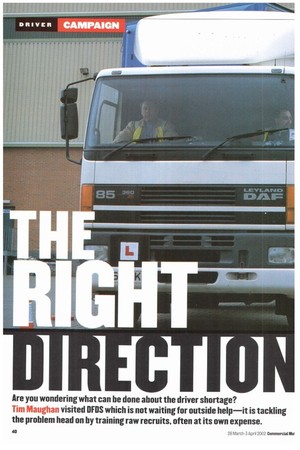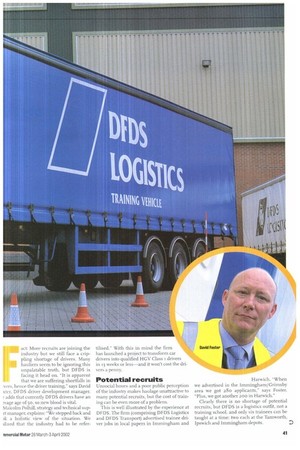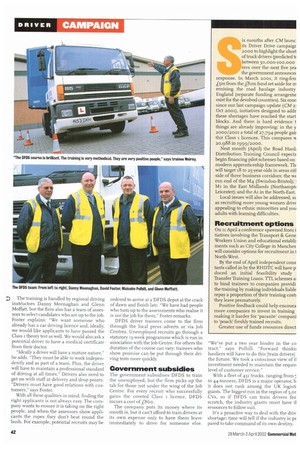Are you wondering what can be done about the driver shortage?
Page 40

Page 41

Page 42

If you've noticed an error in this article please click here to report it so we can fix it.
Tim Maughan visited DFDS which is not waiting for outside help—it is tackling the problem head on by training raw recruits, often at its own expense.
act: More recruits are joining the industry but we still face a crippling shortage of drivers. Many hauliers seem to be ignoring this unpalatable truth, but DFDS is facing it head on. "It is apparent that we are suffering shortfalls in Ivers, hence the driver training," says David ster, DFDS driver development manager. adds that currently DFDS drivers have an !rage age of 50. so new blood is vital.
Malcolm Polhill, strategy and technical suprt manager, explains: "We stepped back and )k a holistic view of the situation. We iliged that the industry had to be refer tilised." With this in mind the firm has launched a project to transform car drivers into qualified HGV Class i drivers in 13 weeks or less—and it won't cost the drivers a penny.
Potential recruits
Unsocial hours and a poor public perception of the industry makes haulage unattractive to many potential recruits, but the cost of training can be even more of a problem.
This is well illustrated by the experience at DFDS. The firm (comprising DFDS Logistics and DEDS Transport) advertised trainee driver jobs in local papers in Immingham and
Harwich. When we advertised in the Immingham/Grimsby area we got 280 applicants," says Foster. "Plus, we got another 200 in Harwich."
Clearly there is no shortage of potential recruits, but DFDS is a logistics outfit, not a training school, and only six trainees can be taught at a time: two each at the Tamworth, Ipswich and Immingham depots.
3 The training is handled by regional driving instructors Danny Meenaghan and Glenn Moffatt, but the firm also has a team of assessors to select candidates who are up to the job. Foster explains: "We want someone who already has a car driving licence and, ideally, we would like applicants to have passed the Class i theory test as well. We would also ask a potential driver to have a medical certificate from their doctor.
"Ideally a driver will have a mature nature," he adds. "They must be able to work independently and as part of a team. Plus, the driver will have to maintain a professional standard of driving at all times." Drivers also need to get on with staff at delivery and drop points. "Drivers must have good relations with customers," says Foster.
With all these qualities in mind, finding the right applicants is not always easy. The company wants to ensure it is taking on the right people, and when the assessors show applicants the ropes they don't beat round the bush. For example, potential recruits may be ordered to arrive at a DFDS depot at the crack of dawn and finish late. "We have had people who turn up to the assessments who realise it is not the job for them," Foster remarks.
DFDS driver trainees come to the firm through the local press adverts or via Job Centres. Unemployed recruits go through a statutory 13-week programme which is run in association with the Job Centre. For others the duration of the course can vary: trainees who show promise can be put through their driving tests more quickly.
Government subsidies
The government subsidises DFDS to train the unemployed, but the firm picks up the tab for those not under the wing of the Job Centre. For every recruit who successfully gains the coveted Class 1 licence, DFDS incurs a cost of itiGo.
The company puts its money where its mouth is, but it can't afford to train drivers at its own expense only to have them leave immediately to drive for someone else. "We've put a two year binder in the co tract," says Polhill. "Forward thinkii hauliers will have to do this [train drivers] the future. We took a conscious view of ti investment needed to maintain the requin level of customer service."
With a fleet of 431 trucks, ranging from ; to 44-tonners, DFDS is a major operator, b it does not rank among the UK logisti giants. The biggest run in the region of 5,0c CVs, so if DFDS can train drivers fro scratch, the industry giants must have ti resources to follow suit.
It's a proactive way to deal with the driv shortage; time will tell if the industry is pr pared to take command of its own destiny.
























































































































































